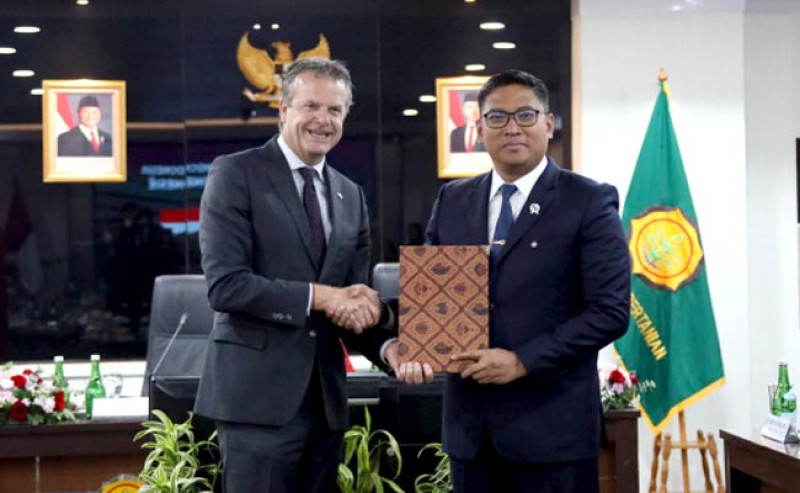On June 17, 2025, Indonesia and the Netherlands signed a landmark Memorandum of Understanding (MoU) to boost sustainable agriculture focused on horticulture and advanced greenhouse technology. The agreement, inked by Deputy Minister of Agriculture Sudaryono and his Dutch counterpart Guido Landheer in Jakarta, aims to modernize Indonesia’s agricultural sector through knowledge transfer, capacity building for young farmers, and joint innovation in greenhouse systems. This article explores the background, benefits, and next steps of this ambitious partnership, using SEO keywords to highlight why this MoU matters for Indonesia’s food security and agri-tech future.
Why Sustainable Agriculture Matters Now
With global concerns around food security, climate change, and rural livelihoods, advancing sustainable agriculture has never been more urgent. Indonesia’s food output surged in early 2025, rice up 52%, corn by 39% compared to the previous year—signalling strong productivity gains . Yet rising demand, changing weather patterns, and resource constraints require smarter farming methods.
The Netherlands ranks among the world’s top agri-exporters despite its small size, thanks to innovations in seeds, irrigation, and greenhouse production . By sharing this know-how, Dutch partners can help Indonesia boost rural incomes, reduce waste, and build resilience, paving the way for long-term self-sufficiency.
Greenhouse Scale-Up and Horticulture Gains
Greenhouse farming is at the heart of the Indonesia, Netherlands MoU. These controlled environments optimize light, water, and climate to dramatically increase yields, often up to 10 times compared to open fields. Growing vegetables and fruits under greenhouse protects them from pests and climate extremes, enabling year-round production and supply consistency.
The MoU outlines pilot greenhouse projects in regions like West Java, North Sumatra, and Central Java, blending Dutch greenhouses with Indonesian agricultural conditions. The agreements free Indonesian farmers from relying solely on imported produce and unlock niche greenhouse products, from cherry tomatoes to specialty herbs.
Empowering Youths Through Capacity Building
Another pillar of this collaboration is empowering the next generation. Indonesia’s leaders want to bring young, tech-savvy farmers into horticulture—a sector historically dominated by older producers.
The MoU commits to joint training programs, university exchanges, internships, and vocational education, equipping young professionals with skills in greenhouse management, precision irrigation, and value-added horticulture . Engaging youth in modern agriculture not only strengthens food systems but addresses rural joblessness by creating decent, knowledge-based careers.
From Knowledge to Ecosystem: Seeds, Irrigation, and Beyond
The MoU isn’t limited to greenhouse structures, it extends to a full farming ecosystem:
- Superior seeds and nursery best practices, ensuring higher-quality planting material.
- Smart irrigation systems that conserve water and cut costs .
- Post-harvest logistics, digitalization, and agribusiness linkages to strengthen value chains.
This multi-dimensional approach reflects the Dutch “food systems” model, integrating innovation, infrastructure, financing, and rural development to build a truly sustainable agricultural sector.
What the MoU Means for Indonesia’s Food Security
By adopting Dutch-led greenhouse production, Indonesia is taking substantive steps toward national food security. Beyond yield boosts, greenhouse farming:
- Enables consistent, all-season output.
- Reduces dependence on imports.
- Cuts post-harvest losses by up to 30–40%.
- Enhances nutrition through fresh fruit and vegetable availability.
This progress follows the national food momentum, rice, corn, and horticulture growth already seen earlier in 2025 —and marks a shift from yield-focused efforts to systematized, quality-based agriculture.
Mutual Benefits and Long-term Collaboration
This MoU is not a one-sided aid package, it’s a two-way partnership. The Netherlands’ Guido Landheer stated that Dutch partners also aim to learn from Indonesian agricultural practices and local knowledge systems.
Additionally, over 30 Dutch investors and greenhouse technology firms have shown interest in working in Indonesia, including seed breeders, agritech suppliers, and financial partners. Dutch Greenhouse Delta plans to host Indonesian delegations and economic missions, fostering business matchmaking and innovation transfer.
This collaboration could serve as a template for future green investments in sectors like water management, agroforestry, and renewable energy.
Roadblocks and How to Overcome Them
Despite its promise, the initiative could face common challenges:
- High upfront capital for greenhouse adoption, mitigated by public–private finance and Dutch grants.
- Adapting technology designed for temperate climates to Indonesia’s tropical conditions, addressed through pilot testing in Java and North Sumatra.
- Local capacity gaps, reduced through targeted training and long-term advisory.
A phased rollout, with small-scale pilots, evaluation, and scale-up—is the smart way forward, ensuring technology is grounded in Indonesian realities.
Indonesia and the Netherlands’ MoU on sustainable agriculture—with its focus on greenhouse horticulture, youth empowerment, and robust agri ecosystems—is a transformative leap forward. Rooted in Dutch know-how and Indonesian potential, this partnership promises to modernize agricultural production and enhance national food security in a climate-resilient, inclusive way.
As Indonesia’s young farmers take the helm of this next-generation food movement, equipped with greenhouse tools and innovation, the nation stands to benefit socioeconomically, nutritionally, and environmentally. For the Netherlands, it represents a chance to deepen trade ties, broaden green investment, and co-create a global model for future-proof agriculture.







 Sunday, 01-03-26
Sunday, 01-03-26







